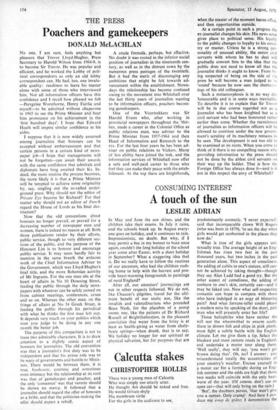CONSUMING INTEREST
A touch of the sun
LESLIE ADRIAN
In May and June the sun shines, and the children take their exams. In July it rains, and the schools break up. In August every- one goes on holiday, and it continues to rain. Impressionistic, no doubt. But why, if I may permit a bee in my bonnet to buzz once again, couldn't the long holiday of the school year come after Easter, with a short holiday in September? What a staggering idea that is. Do we really have to follow the routines of our ancestors, who had the children rush- ing home to help with the harvest and pro- vide heart-warming foregrounds to paintings of rural England?
After all, our ancestors' journeyings are not in other respects followed. We do not, like Chaucer's pilgrims, travel for the ulti- mate benefit of our souls; nor, like the invalids and valetudinarians who preceded Beau Nash, for the placebos of a pump room; nor, like the patients of Dr Richard Russell of Bright(helmst)on, in the pleasant conviction that water from the briny is at least as health-giving as water from chaly- beate springs—when drunk, that is to says We holiday no longer for our spiritual or physical salvation, but for purposes that are
predominantly cosmetic. 'I never expected', said that incomparable clown Will Rogers (who was born in 1879), `to see the day when girls would get sunburned in the places they now do.'
What is true of the girls appears uni- sexually true. The average height of an Eng- lishman has risen two feet in the past thousand years, but two inches in the past generation alone. This aspect of comeliness, the adding of cubits to one's stature, still can- not be achieved by taking thought—though they say Alan Ladd had a good try. But the other aspect of comeliness, the adding of sunburn to one's skin, certainly can—and it may be faked too. Now what self-respecting romantic can hope to compete with those who have indulged in an orgy of blistering pain? And what fortune-teller could please a modern miss by speaking of the short, pale man who will presently enter her life?
Those heliophiles who have neither the will nor the wherewithal to swarm south, there to drown fish and chips in pink plonk. must fight a subtle battle with the English climate. Let me give them a tip. Select the bleakest and most remote roads in England, and undertake a motor tour along them. 'Well really', they will say, 'you won't get brown doing that'. Oh, no? I answer: you misunderstand totally the eccentricities of your country's weather. Encase yourself in a motor car for a fortnight during an Eng- lish summer and the odds are high that those two weeks will coincide with the only heat- wave of the year. (Of course, don't use an open car—that will only bring on the rain) 'But', the doubters persist, 'that won't give you a suntan. Only cramp'. And here I pro- duce my coup de grace; I demonstrate the initiative which has always enabled Man in the final event to defeat the elements. Take your motor tour, I earnestly counsel, in a new car, fresh from the factory, carefully assembled by contented craftsmen, approved by eagle-eyed inspectors, extolled by enthusi- astic agents—a simple, shiny, gleaming, virgin English-made vehicle (or even, if needs must, a foreign one, though for the particular pur- pose I have in mind this may not prove quite so reliable as a home-grown counterpart). Given this one piece of essential equipment, the suntan is as good as assured.
For the whimsical aspect of new cars is that, by and large, they don't work. Within thirty miles of one's departure, it will be sur- prising if the car does not begin to cough: after a further thirty, it will be miraculous if it does not expire. But be prepared. Quickly strip off each superfluous stitch of clothing, lift the car bonnet and rummage about in the engine. Note how the sun, reflecting off each new shining surface, starts to do its punishing job. Who said the lady's not for burning? You have (perhaps) an hour before the weather sees the trick that is being played on it and draws clouds across the blazing sun. But by this time, with luck and the knowledge gained from last winter's evening classes, you will have located and corrected the trouble. As the only-temporary drizzle descends, you are already sputtering happily on your way, looking forward to the next mechanical crisis. Furthermore, since each breakdown is invariably more complex than the last, the time spent in the sun increases at each session—which is precisely what the pundits recommend.
'And where', your friends will ask, 'did you get so brown? St Tropez? Sicily? Spetsai?"No', you reply, feeling just as though you had stepped out of a book by Stephen Potter, `—carburettor trouble on the Yorkshire moors'.































 Previous page
Previous page